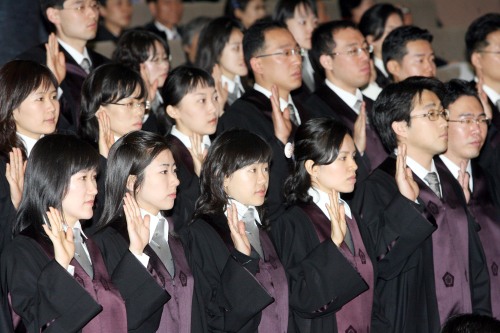The first bar exam for law school students scheduled to graduate in February is on the way.
While the exam is an important milestone in the country’s efforts to renovate the structure of the legal industry, law school graduates are in for a tough time in finding employment.
“To be honest, I chose to go to a law school because I thought it would be a less difficult way to become a lawyer than taking the existing judicial exam,” a law school student said, declining to be named. He added that studying for the judicial exam to recruit judges and prosecutors, for which some of his acquaintances have studied for years without any guarantee of success, was a risk he was unwilling to take. Law schools were introduced in 2007 as part of the government’s efforts to increase diversity among law practitioners and to address the issue of vested interests and exclusivity in the legal community.
Until this year, all law professionals including judges, lawyers and prosecutors were selected through the annual state judicial exam. Those who pass the exam undergo two-year training at the Judicial Research and Training Institute, and are appointed judges or prosecutors or join law firms, according to the results of their studies.
“I’ve known that graduating from law school doesn’t guarantee that I would immediately find a job, but hearing about how difficult it could be from the news lately has made me question my decision.”
According to the Ministry of Justice, of the 2,000 law school students graduating this year, 1,698 applied for the bar exam.
While the exam is an important milestone in the country’s efforts to renovate the structure of the legal industry, law school graduates are in for a tough time in finding employment.
“To be honest, I chose to go to a law school because I thought it would be a less difficult way to become a lawyer than taking the existing judicial exam,” a law school student said, declining to be named. He added that studying for the judicial exam to recruit judges and prosecutors, for which some of his acquaintances have studied for years without any guarantee of success, was a risk he was unwilling to take. Law schools were introduced in 2007 as part of the government’s efforts to increase diversity among law practitioners and to address the issue of vested interests and exclusivity in the legal community.
Until this year, all law professionals including judges, lawyers and prosecutors were selected through the annual state judicial exam. Those who pass the exam undergo two-year training at the Judicial Research and Training Institute, and are appointed judges or prosecutors or join law firms, according to the results of their studies.
“I’ve known that graduating from law school doesn’t guarantee that I would immediately find a job, but hearing about how difficult it could be from the news lately has made me question my decision.”
According to the Ministry of Justice, of the 2,000 law school students graduating this year, 1,698 applied for the bar exam.

Those not taking the examination have mostly chosen to take their chances with other state examinations for civil service, or have opted to study at different institutions in light of the difficulties expected in finding employment.
Such developments are a boon for those taking the examination, at least in light of obtaining their attorney’s license.
With the authorities having planned to pass 75 percent of the total graduates, the majority of the applicants are on course to achieve a license to practice law.
However, the trouble for a large number of law school graduates begins after they pass the bar.
While the examination will have a pass rate of over 90 percent, only 500 or so newly licensed law professionals will be able to find employment within the judicial services and law firms.
In addition, law school graduates’ job prospects are further dampened by regulations regarding such individuals opening their own practices.
Lawyers who graduate from law schools are only able to open their own offices after they complete a six-month internship at a law practice whose staff includes a lawyer with more than five year’s experience.
Although the Ministry of Justice has designated 211 organizations including government organizations, law firms and large companies, for providing on-the-job training, the number of vacancies is said to fall far short of the number of law school graduates expected to pass the bar exam.
While the universities that operate law schools are doing their part to support students’ job hunting, there appears to be a lack of communication between the concerned bodies.
“Law firms and companies with legal teams contact the school with job opportunities, and we relay the information to the students,” an official at Hanyang University law school said. She added that those looking to hire newly licensed lawyers appear to be sending out such communications to a select number of law schools.
She added that a number of companies have contacted the school enquiring about providing internship posts to law school graduates.
By Choi He-suk (cheesuk@heraldcorp.com)
-
Articles by Korea Herald










![[Hello India] Hyundai Motor vows to boost 'clean mobility' in India](http://res.heraldm.com/phpwas/restmb_idxmake.php?idx=644&simg=/content/image/2024/04/25/20240425050672_0.jpg&u=)









